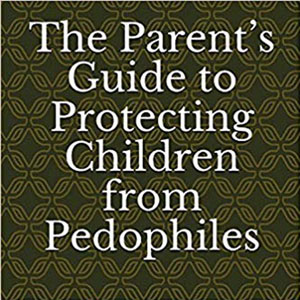Hiding behind a keyboard using different genders, names, ages, and ploys, the predator searches Twitter, Tumblr, Snapchat, Tic Toc, Instagram; wherever kids are.
Social media is the children’s park, their playground, their place to meet. It is here they play games, share daily events, and complain about parents. They seek advice about boyfriends or girlfriends, school, and whatever is on their minds.
The online predator looks for children who feel unloved, abandoned, unpopular, sad, alone, unwanted. Those are his prey. The truth is, all children are his prey. His target is a child. Any child will do; the more vulnerable the better.
An alert sounds: A boy on Instagram posts #brokenpromise!
The predator responds: “Hey, my father makes promises and never shows up. I hate him!” From here, the predator builds trust, planning a secret meeting.
Posing as a 12-year-old boy on a different site, he posts “#myparentsdivorced. “No one understands. No one gaf. I hate myself!” He gets 35 hits.
And on another site, he “confesses” to a child, “You understand me. No one else does ☹. You are the only one I can talk to.” Guilt and manipulation often work. He tells the child he loves her/him and tries to set up a meeting.
The methods of protecting children from online predators shifts a bit for adolescents. Teens differ in the quantity and creativity of the drama. They are hormone-driven, rebellious, impulsive, and striving to be independent. The predator forms an alliance by providing understanding and support. He assures them of his love, “Just us against them.” He promises unrealistic fantasies of freedom, sex, and whatever they want. The hook is set!
It’s important to ask your child “what will happen after you meet?” There will be an amber alert, they will have to hide, he will run out of money, he or she may find themself in a ditch. The predator will go to prison.
The predator’s use of guise and deception is limited only by his sick imagination. She/he has no regard for the well-being of children.
Protecting Children from Online Predators:
How Does a Parent Intervene?
The lion cannot protect himself from traps, and the fox cannot defend himself from wolves. One must therefore be a fox to recognize traps, and a lion to frighten wolves.
― Niccolò Machiavelli, The Prince
Warnings and lectures are necessary, yet may not be effective in protecting children from online predators. They have heard it. Eyes roll. Children’s ability to remember those warnings “in the moment” goes out with the tide.
Make it a game.
Invite the child to imagine what a bad guy might say to trick a child. Boys may enter that game bearing swords, guns, armies or Ninjas, stomping the enemy with vigor. “Can you boys spot the bad guy? What does the online bad guy say to trick the boys?”
The predator posts: #videogamesswitch “Looking for kids to test Mario, Animal Crossing, and beta games. Keep games, Xbox, Switch, PS5!” Thousands of dollars of free games and systems are a powerful lure. Ask the kids “why is this a con?”
Here is the catch. The software companies already have testers of their own. Furthermore, any legitimate gaming company finds kids through agencies, schools, and other sources. They would give the name of the corporation sponsoring this and a contact number. More importantly, adults cannot contract with children without a parent’s written consent. The parent would have to contact the corporation and go from there.
The same applies to the predator #searchingforyoungmodels with offers of free designer clothes, or photos in magazines! Why is this a con? Minor models or beauty contestants must have a professional portfolio and an agent. None of this is legal without the parent’s written consent. And they do not hand out designer clothes.
From a lost dog, an ailing child, death of a loved one, statements that he is thinking of harming himself, that no one loves him, or that his wife left him; this poor man is lonely and not understood is looking for children to make him feel better. Ask your child how they or their friends should respond. The right answer is to take a screenshot. Leave. Tell an adult. It is not the job of a child to fix an adult.
The bad guys use guilt and any other means necessary. Saying “No” is okay and important. It also sets strong boundaries for the child to say “NO” to sexual approaches in real life. When the conversation remains congruent with the age and topic, great. If the conversation is weird, inappropriate, uncomfortable, the child can take a screenshot, sign off, and tell a parent. If anyone online expresses abuse or danger, the child should take a screenshot and tell an adult immediately.
Teenagers may believe they are too smart to be fooled. BUT they may accept it can happen to a friend. Ask your teen what she has thought of to protect herself online. Asking for a friend!
One precaution teens and adults can take is to Zoom the person and see who you are talking to before meeting. Also, check any social media sites he or she is on. Block a person who makes excuses to not appear on live video. A person worthy of your time and respectful of your concerns will comply. If these situations become inappropriate in any way, leave and report to an adult. Take a friend along.
Horror stories abound. A man followed two teenage girls in his car, pulled over, and grabbed one girl by her arm. As he tried to pull her into his car, her friend pulled on the other arm. Both girls together broke loose from him. He ran to his car and took off but not before the girls got his tags. He is in prison doing 20 years. It happens that fast. Being in pairs saved the girl’s life.
One last thing: Trust Your Gut! If it feels wrong, something feels off, you should trust that. Leave or do not show up. Teaching teens and children to trust that “uh-oh” feeling is vital to protecting children from online predators.
Parents and teens can only do so much. The cunning of some predators is so dark and evil they do get through. Make sure your kids understand they need a backup plan. If they go, bring someone along. Let someone know where they are going and who they are meeting. Why? Because people love them and care, and it is the responsible thing to do.
MBC, the author, has published The Parents Guide To Protecting Children from Pedophiles (Amazon). He can be contacted at mbcprevention@gmail.com
Do you know your score?
Discover your ACE score and unlock a new understanding of your life. Take the test and gain insights into how your early experiences shape your well-being. Don't let your past define you – empower yourself with knowledge.

MBC
Offender in recovery. Advocate for preventing ACEs
I show ways to recognize the behaviors of sex offenders and breakthrough their feigned innocence, denial, blaming, and excuses.
